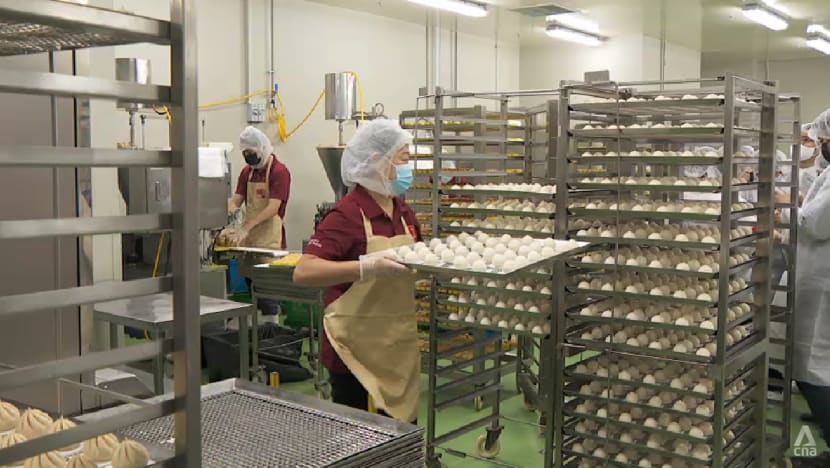More than 2,500 jobs to be created in Singapore’s food manufacturing sector
This is part of the new Jobs Transformation Map for the sector, which recommends strategies for businesses to boost employees’ competitiveness and capabilities.

By next year, Sin Mui Heng Food Industries is set to automate 80 per cent of its manufacturing processes and raise its productivity by five times.
SINGAPORE: More than 2,500 jobs in the food manufacturing sector will be created in the short term, allowing workers to take on higher value-added tasks and increase productivity.
This is part of the new Jobs Transformation Map (JTM) for the sector, which recommends strategies for businesses to boost employees’ competitiveness and capabilities.
About a quarter of 22 jobs studied will require redesign, such as training production supervisors to use automation for manual tasks.
It also identified eight emerging job roles including those in the creation of novel foods and data analytics.
SINGAPORE AS TRUSTED FOOD LEADER IN ASIA
“Business and workforce transformation must go hand-in-hand. Businesses cannot transform unless their workers are capable of supporting new business models as well as new job roles,” said Manpower Minister Tan See Leng on Wednesday (Dec 14).
“Having skilled workers is what enables a business to be able to transform. At the same time, when businesses transform, workers will also be more motivated to go for reskilling and upskilling to seize new opportunities.”
The job transformation map was unveiled alongside the refreshed food manufacturing sector Industry Transformation Map (ITM) 2025, which was launched by Dr Tan on Wednesday.
The new ITM aims to establish Singapore as a trusted food leader to launch quality brands into Asia.
Among the key strategies of the refreshed road map is overseas expansion.
“We have built a significant amount of trust, reputation, credibility and integrity in terms of all of our supply,” said Dr Tan, who is also the Second Minister for Trade and Industry.
“So, the Singapore stamp is actually a stamp of quality and a very high-end product in terms of safety, in terms of trust.
“So through that, these Singapore startups, these (small- and medium-size enterprises) should leverage on the Singapore brand name, made in SG, to then be able to export to many countries all over the world.”
Other ITM strategies include a new focus on enhancing supply chain resilience, amid the continuing pandemic and energy crisis.
Dr Tan, who was speaking at the official opening of Sin Mui Heng Food Industries’ Bedok Food City factory on Wednesday, said Singapore has seen "an increase in vulnerabilities" due to food supply and price fluctuations.
Companies are also encouraged to take on green practices across the food value chain.
RETRAINING WORKERS FOR VALUE-ADDED TASKS
Sin Mui Heng Food Industries’ new factory is equipped with smart technology that allows its lights, temperature and even air quality to be controlled automatically. This translates into time savings of five hours per day.
By next year, the company is set to automate 80 per cent of its manufacturing processes and raise its productivity by five times under its expansion plans.
“But nevertheless, we do not reduce the number of manpower, though we save quite a number of people,” Mr Johnson Tay, operations director at Sin Mui Heng Food Industries.
“Every machine used to take about three employees to run the machine but currently we only need one. But bear in mind that we increased the size of the factory by almost two times, we are still capping it at the same number of employees at the moment.”
This has allowed the dim sum manufacturer to retrain and redeploy workers to take on new tasks that improve its productivity.
Sin Mui Heng Food Industries, which has customers in more than a dozen countries, has plans to expand to other countries including the United States and Ghana.
The company currently exports 20 per cent of its products overseas, but hopes to grow that share to 50 per cent within the next five years.


















